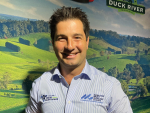Under DIRA, all dairy companies should be required to disclose how much they pay for milk, says Lloyd Downing, a Morrinsville dairy farmer and former Waikato Federated Farmers president.
He says some dairy companies “give you a little bit for that, a payment for this and a payment for that”. “The more they do that the easier it is to hide the total pay check.
“What farmers need to do is divide their milk cheque by the number of kilos they supply,” he says.
“NZ farmers don’t. NZ farmers are the best in the world at turning grass into milk but they are terrible businessmen in general. That is pretty tough but not far off the truth.
“To back that up, how many farmer-owned companies have we got? We used to control the meat industry, the wool industry, dairy meat, and there used to be a veterinary club in every small town in NZ. When I first started there was a veterinary clinic and a vet club in Morrinsville; now there are about five vets in Morrinsville.
“That is telling me we are paying too much for our veterinary services because our veterinary clubs and our farmer-owned businesses are not well organised.
“If farmers are so good at business why don’t we still control the meat industry, the wool industry… dairy meat? The only reason we still control our fertiliser industry is because we have two fertiliser companies trying to beat each other to death on the dividend.”
So while NZ First should butt out of Fonterra business, Fonterra farmers themselves should take more notice of what is going on in their business, Downing says.
“They should be coming along to a lot more meetings than they do.
“The biggest issue facing our company is the share structure. They are going to be working on that but you’ve got to watch the fenceposts to see if they move.”
Dairy News asked Fonterra to respond to the NZ First criticisms but the co-op said it is not commenting at this time.


















